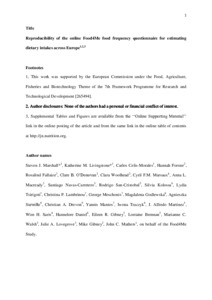MARSHALL, Steven J., LIVINGSTONE, Katherine M., CELIS-MORALES, Carlos, FORSTER, Hannah, FALLAIZE, Rosalind, O'DONOVAN, Clare B., WOOLHEAD, Clara, MARSAUX, Cyril F.M., MACREADY, Anna L., NAVAS-CARRETERO, Santiago, SAN-CRISTOBAL, Rodrigo, KOLOSSA, Silvia, TSIRIGOTI, Lydia, LAMBRINOU, Christina P., MOSCHONIS, George, GODLEWSKA, Magdalena, SURWIŁŁO, Agnieszka, DREVON, Christian A., MANIOS, Yannis, TRACZYK, Iwona, MARTÍNEZ, J. Alfredo, SARIS, Wim H., DANIEL, Hannelore, GIBNEY, Eileen R., BRENNAN, Lorraine, WALSH, Marianne C., LOVEGROVE, Julie A., GIBNEY, Mike and MATHERS, John C.
(2016).
Reproducibility of the Online Food4Me Food-Frequency Questionnaire for
Estimating Dietary Intakes across Europe.
The Journal of Nutrition, 146 (5), 1068-1075.
[Article]
Documents
25685:555366
![[thumbnail of Marshall_ReproducibilityOnlineFood4Me(AM).pdf]](https://shura.shu.ac.uk/25685/8.hassmallThumbnailVersion/Marshall_ReproducibilityOnlineFood4Me%28AM%29.pdf)

Preview
PDF
Marshall_ReproducibilityOnlineFood4Me(AM).pdf
- Accepted Version
Available under License All rights reserved.
Download (853kB)
|
Preview
Abstract
Background: Accurate dietary assessment is key to understanding nutrition-related outcomes and is essential for
estimating dietary change in nutrition-based interventions.
Objective: The objective of this study was to assess the pan-European reproducibility of the Food4Me food-frequency
questionnaire (FFQ) in assessing the habitual diet of adults.
Methods: Participants from the Food4Me study, a 6-mo, Internet-based, randomized controlled trial of personalized nutrition
conducted in the United Kingdom, Ireland, Spain, Netherlands, Germany, Greece, and Poland, were included. Screening and
baseline data (both collected before commencement of the intervention) were used in the present analyses, and participants
were included only if they completed FFQs at screening and at baseline within a 1-mo timeframe before the commencement
of the intervention. Sociodemographic (e.g., sex and country) and lifestyle [e.g., body mass index (BMI, in kg/m2
) and physical
activity] characteristics were collected. Linear regression, correlation coefficients, concordance (percentage) in quartile
classification, and Bland-Altman plots for daily intakes were used to assess reproducibility.
Results: In total, 567 participants (59% female), with a mean 6 SD age of 38.7 6 13.4 y and BMI of 25.4 6 4.8, completed
both FFQs within 1 mo (mean 6 SD: 19.2 6 6.2 d). Exact plus adjacent classification of total energy intake in participants was
highest in Ireland (94%) and lowest in Poland (81%). Spearman correlation coefficients (r) in total energy intake between
FFQs ranged from 0.50 for obese participants to 0.68 and 0.60 in normal-weight and overweight participants, respectively.
Bland-Altman plots showed a mean difference between FFQs of 210 kcal/d, with the agreement deteriorating as energy
intakes increased. There was little variation in reproducibility of total energy intakes between sex and age groups.
Conclusions: The online Food4Me FFQ was shown to be reproducible across 7 European countries when administered
within a 1-mo period to a large number of participants. The results support the utility of the online Food4Me FFQ as a
reproducible tool across multiple European populations
Actions (login required)
 |
View Item |



 Tools
Tools Tools
Tools